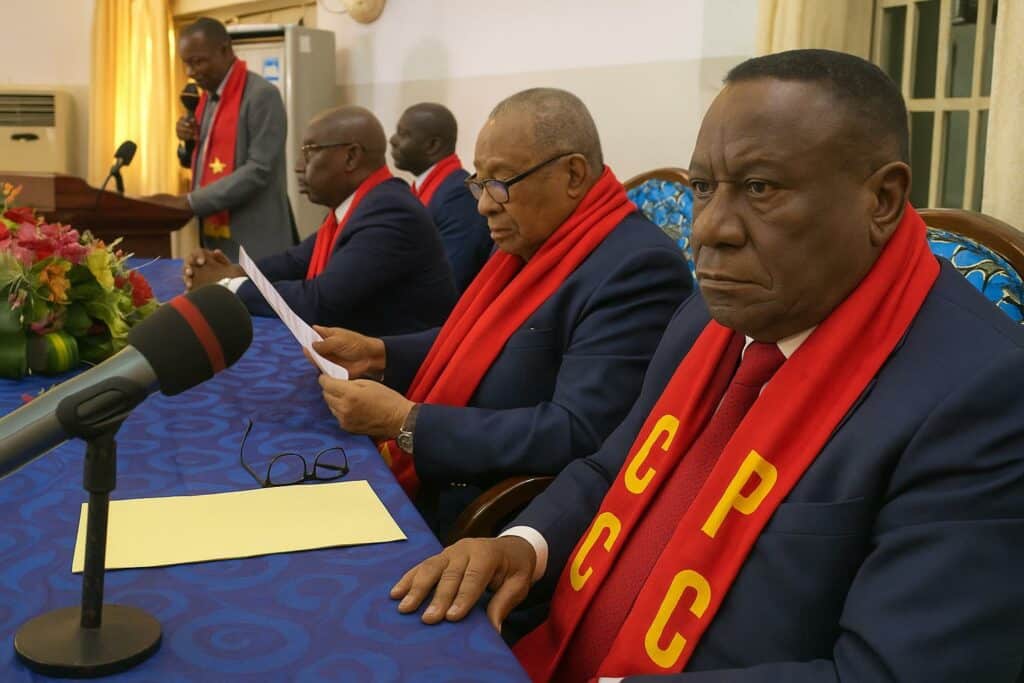Owando Session Signals Renewed Momentum
In the humid late-August air of Owando, the Congolese Labour Party (PCT) convened the fourth ordinary session of its Cuvette federal council. The gathering provided a deliberately high-profile backdrop for Secretary-General Pierre Moussa to present and formally install Rigobert Maboundou as political commissary for the department. In a hall filled with cadres, militants and local dignitaries, Moussa framed the ceremony as part of “the dynamic of revitalisation” endorsed by the party’s Central Committee and Political Bureau. The venue was not chosen at random: Cuvette has long served as a bastion of electoral support for the governing majority, and Owando remains a symbolic anchor in the political cartography of Congo-Brazzaville.
Observers noted the timing. With the sixth ordinary congress of the PCT scheduled for 2025 and the presidential election anticipated in March 2026, the Owando session marked the opening of a longer mobilisation sequence. Moussa reminded participants that the department “must be a model in organisation, engagement and results”, calling for resolutions capable of preparing the grassroots for an electoral marathon now visible on the horizon.
The Role of a Political Commissary in Party Doctrine
Political commissaries constitute an institutional leg rooted in the PCT’s historical architecture. Their mandate blends political pedagogy, conflict mediation and organisational oversight. By design, the position provides a direct line of accountability between the national leadership and local structures, allowing the party to detect sociopolitical shifts at an early stage while ensuring discipline among militants.
Maboundou, a familiar figure within Cuvette’s public sphere, offered a concise statement of intent. He pledged to anchor his work in three pillars—assistance, training and mobilisation—and stressed that he would act “neither to substitute for the federation, nor to encroach on the prerogatives of elected officials, still less to hinder the action of grassroots organs”. The nuance is significant; by affirming respect for local autonomy, he seeks to avoid the perception of top-down intrusion while retaining sufficient authority to arbitrate when intra-party disputes arise.
Cuvette’s Strategic Weight in National Politics
Cuvette occupies a unique place in the national imagination and in the PCT’s electoral calculus. The department offers a combination of demographic concentration, natural resources and historical loyalty to the ruling coalition. Moussa referred to this reality when he argued that Cuvette “deserves particular attention” given its symbolic charge and its “human and natural wealth”.
Successive electoral cycles have demonstrated that victories secured in Cuvette often create momentum in contiguous regions. For that reason, the new commissary’s performance will be scrutinised not only by departmental stakeholders but also by strategists in Brazzaville who interpret local dynamics as early indicators of broader national sentiment.
Preparing the Roadmap to 2025–2026 Milestones
The preparatory calendar unveiled by the party leadership is precise. A federal congress is slated for November 2025, followed one month later by the national congress that will confirm the PCT’s strategic line and candidate endorsements. The presidential election of March 2026 crowns this sequence. In his address, Maboundou underscored that the federation’s success would depend on the capacity to maintain what he called “the flame of the PCT” through continuous engagement with youth, women and local economic actors.
Such engagement is not purely rhetorical. The department faces tangible economic, social, cultural and environmental challenges that shape the electorate’s expectations. By drawing attention to these realities, Maboundou implicitly signalled that campaign messaging would blend national themes with locally tailored proposals, reinforcing the party’s emphasis on proximity politics.
An Evolving Contract Between Party and Society
Beyond organisational mechanics, the appointment reflects an evolving contract between the PCT and the communities it governs. The party seeks to translate stability at the centre into tangible dividends at the periphery. At the same time, local populations increasingly expect responsive governance that addresses livelihoods, infrastructure and environmental stewardship.
Maboundou’s mission, demanding yet rich in potential, therefore transcends routine mobilisation. He must function as “vigie politique”, in Moussa’s words, scanning the horizon for both risks and opportunities. By institutional design, success will be measured less by high-profile rallies than by the quiet consolidation of trust between the party and its social base.
Should the new commissary succeed, Cuvette could again serve as a laboratory for the PCT’s narrative of continuity and renewal—a narrative likely to feature prominently as Congo-Brazzaville approaches the pivotal votes of 2025 and 2026.

